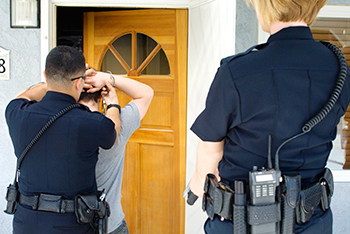 June 13, 2014 – Although police may have “broken the threshold” of a Racine apartment while following leads without a warrant, Cordarol Kirby is still on the hook for the sawed-off shotgun police found in a backpack inside the apartment.
June 13, 2014 – Although police may have “broken the threshold” of a Racine apartment while following leads without a warrant, Cordarol Kirby is still on the hook for the sawed-off shotgun police found in a backpack inside the apartment.
In State v. Kirby, 2013AP896-CR (June 11, 2014), a three-judge panel for the District II Court of Appeals upheld a decision to deny Kirby’s motion to suppress the evidence, concluding the police search met the exception for “exigent circumstances.”
“We have discussed the centerpiece of Kirby’s argument – that the officer stepped over the threshold without a warrant – and rejected it on exigent circumstances grounds,” wrote Richard Brown, chief judge for the Wisconsin Court of Appeals.
Kirby had argued that officers could not enter the apartment without a warrant absent exigent circumstances – such as the belief that someone was in danger or the suspect could escape – and those circumstances were not present when they entered.
After police had entered the apartment, they received a new tip that one of the men could be carrying a black backpack, and the backpack contained a sawed-off shotgun. It was at that point that police, outnumbered five to two, thought danger was afoot.
But the appeals court rejected the argument that exigent circumstances must be present at the outset: “[I]t is an important point to make that, while exigent circumstances may justify entry, the fact that entry has already been made does not necessarily invalidate reliance on the exigent circumstances doctrine,” Brown wrote.
Police Follow Leads
A group of juveniles gathered in an apartment in Racine after involvement in a fight nearby. One of them, Kirby, was wearing a Chicago Bulls cap.
Meanwhile, the officer who responded to the fight received a tip that the main aggressor wore a Chicago Bulls cap, and threatened to return to the scene with a gun.
Then the officer they received a tip from a landlord who said he thought some juveniles involved in a fight had congregated at his apartment complex. Two officers went there. A female tenant let them inside the complex, where they found a man in the hallway.
They asked him some questions and moved toward an apartment where the door was wide open. Five men were inside, one wearing the Chicago Bulls cap described by the investigator. One officer began questioning the Bulls fan in the hallway.
The other officer stood in the doorway of the apartment questioning the others. At some point, the officer “broke the threshold of the apartment” by stepping inside the apartment. Nothing seemed amiss until the officer received another tip by phone.
An investigator called and said an informant gave information that if there was a black backpack present, it probably had a sawed-off shotgun inside of it. The officer was standing a few steps inside the apartment and moved slightly to canvas the scene.
From that vantage point, the officer saw a black backpack on the couch in the family room. At that point, the officer testified to feeling vulnerable, noting that five young men were present and only two officers, and there could be a loaded shotgun nearby.
The officers placed all of them in handcuffs. One officer picked up the back pack and asked who owned it. All of them denied ownership. No one objected when the officer said she was going to open it. Inside, the officer found the sawed-off shotgun.
After back-up was called, the officer searched the backpack more thoroughly and found a medical card bearing Kirby’s name. A witness also said it was Kirby’s backpack.
The state charged Kirby for possessing the sawed-off shotgun and carrying a concealed weapon. Ultimately, after the circuit court denied his motion to suppress evidence, he was convicted. Kirby appealed on the ground that police conducted an illegal search.
Search was Legal
Although Kirby did not live there, he said he had a reasonable expectation of privacy in the apartment as a guest who often stayed there. The appeals court assumed without deciding that Kirby had a reasonable expectation of privacy, ruling on other grounds.
Regardless of whether the officer was inside the apartment when she received information about the backpack, the appeals court explained, the result is the same.
“[T]his new information would have created the same exigent circumstances justifying entry into the apartment to see if there was a black backpack near these men like the one described,” Judge Brown explained. The threshold issue was irrelevant, he said.
In addition, the appeals court rejected Kirby’s claim that police illegally opened the backpack. The court noted that Kirby and the others disavowed ownership of the backpack, thereby releasing any expectation of privacy in the backpack’s contents.
Even assuming an expectation of privacy existed, the police were also justified in searching the backpack based on the exigent circumstances doctrine.
“Once she visually confirmed that there was a backpack matching the description of the one that the informant said contained loaded weapons, sitting right next to the men, the officer was justified in checking the backpack,” Justice Brown concluded.
